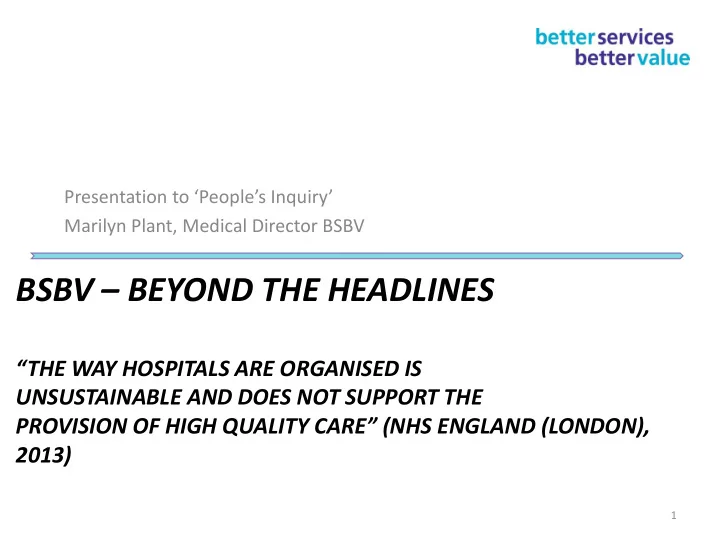

Presentation to ‘People’s Inquiry’ Marilyn Plant, Medical Director BSBV BSBV – BEYOND THE HEADLINES “THE WAY HOSPITALS ARE ORGANISED IS UNSUSTAINABLE AND DOES NOT SUPPORT THE PROVISION OF HIGH QUALITY CARE” (NHS ENGLAND ( LONDON), 2013) 1
Summary This presentation will cover three key issues: 1. How do changes in the SWL population affect the local NHS? 2. How do we adapt? What should the local NHS look like? 3. Finances – how much money do we have, how do spend it and how does BSBV help?
What’s changed? • Our population’s changed faster than our health system has • The NHS has been slow to adapt, meaning we have an outdated model of care designed to look after the population we had 30 years ago vs
How do we adapt (1)? • Hospital not always the answer - 60% of attendees at A&E could be looked after in primary care • A&E the default – lack of alternatives for residents
How do we adapt (2)?
How do we adapt (3)? • Need a better co-ordinated system that makes takes a more holistic view of more complex patients (physical, mental and social health) • 70% of hospital beds occupied by over 65’s, some moved 4-5 times during admission • Lack of capacity in community, primary and social care means hospital becomes only option.
How do we adapt (4)? • Our local hospitals vary significantly in terms of quality, and none of them meet London Quality Standards • These standards are about ensuring high quality of services in all our hospitals 24/7 (LHP Audit, 2011) • Across London, mortality at weekend is 12% higher than during the week (NHSE, 2012) • We need a 7 day service that meets minimum Quality Standards
How do we adapt – workforce pressures (NHS and social care workforce: meeting our needs now and in the future? Kings Fund, 2013)
BSBV Programme – what is it and what does it do? • BSBV is a joint programme, funded by seven CCGs, that has been tasked with reviewing hospital services in South West London. • It has been running since 2011, and represents the collective views of over 100 doctors, nurses, midwives and allied health professionals from primary, secondary and community care. • In order to meet the London Quality Standards across all five sites, we would need to recruit 261 additional consultants. There would also be a shortfall in paediatric nurses and trainee doctors. • This puts additional strain on existing services and the people tasked with delivering them
What is BSBV proposing? • We’re proposing three expanded major acute hospitals, centralising the expertise we have and allowing us to meet the minimum quality standards. • There would also be two local hospital sites, similar to that at Queen Marys Roehampton. These would have outpatient clinics, an urgent care centre, day case surgery, community beds and diagnostics. One would also be a large elective hospital, where you could go for everything from a hip op to bariatric surgery. • St Georges remains as a specialist teaching hospital, providing world class specialist services to SWL residents.
What are the challenges? • Re-organising services is not the easiest route, but essential if we are to improve quality and save lives – if there is a different way of doing it tell us! • Level of opposition from some groups difficult for clinicians – this is not their day job • We get sucked into the politics. This is not about privatisation or about cost cutting agendas of x governments. It’s about ensuring we have a local NHS that looks after our patients • Reduced income for Local Authorities puts additional pressure on the social care system, and therefore increases admissions and delays discharge.
What else needs to change? • Improve quality of, and access to primary care and invest in community services • Ensure NHS and LAs are joined at the hip, avoiding duplication of effort and pooling resources to reduce pressure on the system • Invest in new technologies that allow as many people as possible to manage their own health • Forge closer links between mental and physical health • Work with LAs, the charity sector and the government to improve health and wellbeing – lifestyle diseases crippling the NHS
Isn’t this all about money? We spend £1.7bn in SWL on NHS services (around £1200 per Other person) (1%) Primary Care (12%) Continuing Care (5%) Community Services (9%) Acute Hospitals (60%) Mental Health (13%) Source: CCG plans 2013/14 (BSBV CCG Commissioning model)
Funding is unlikely to increase A Call to Action, NHS England (London), 2013
We have to spend money more effectively • We are unable to influence local NHS income and therefore must manage a steady increase in demand and costs (around £290m from 12/13 to 17/18) with the same budget • After adjusting for inflation, we have a local overall challenge for the 6 CCGs in SWL of £160m in 2017/18 • CCGs through BSBV would save £62m by taking £112m of activity out of hospitals and re-providing in the community* • This means more services in the community, improved quality at SWL hospitals and a sustainable local health economy Note: * includes out of area providers
In Summary • We know we don’t have all the answers and we know your input will improve our proposals • Continuation of status quo in no-ones interest – we need to have a conversation about the balance between quality and safety vs journey times • We need to overcome institutional loyalties if we want to future-proof our NHS. This is made very difficult under the current system. • Never an easy process but will have to happen either way – if we don’t act now, it only becomes more difficult • Campaigners may see retaining all services on all hospital sites as a victory – celebrations will be shortlived
Recommend
More recommend